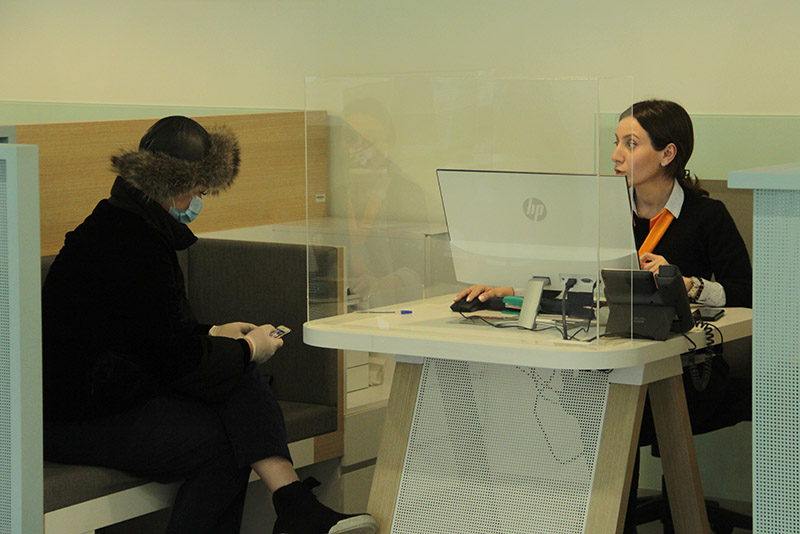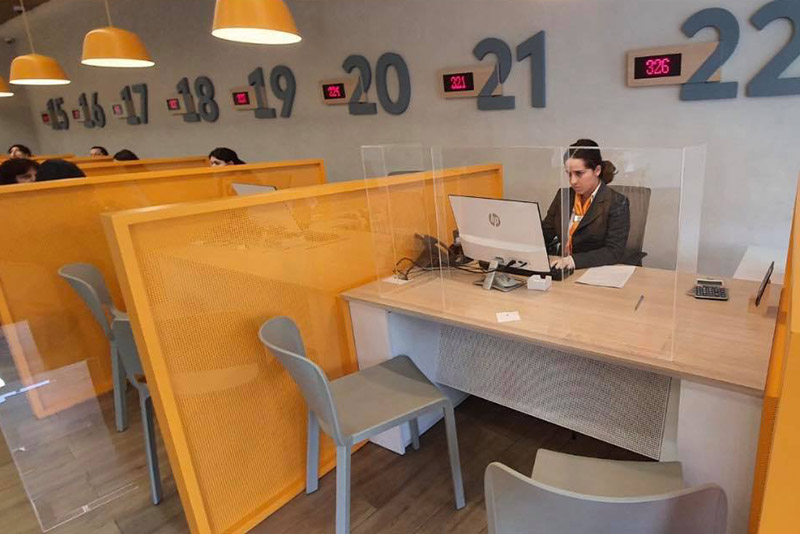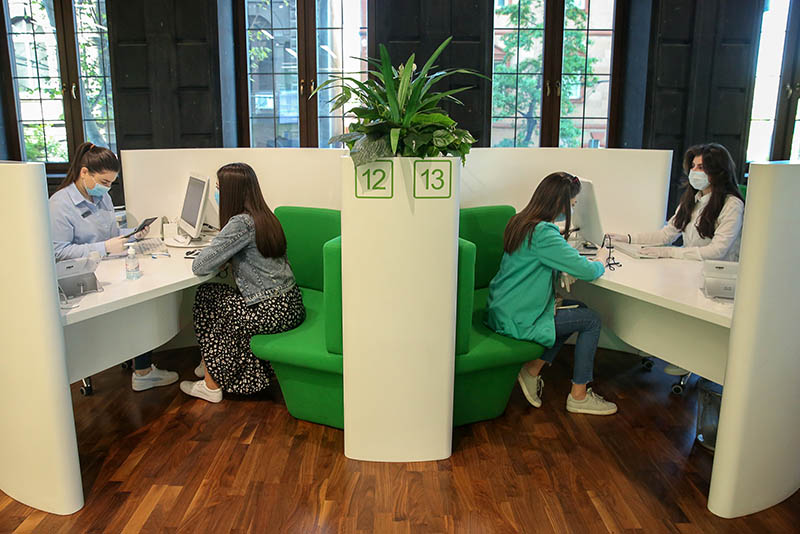By Elena Gex, Kymbat Ybyshova, and Tamar Barbakadze
Amid the looming economic fallout of the COVID-19 pandemic, banks face many difficult choices—including how to protect their workers and clients while still providing essential services.
Responses of three banks that are IFC clients in Eastern Europe and Central Asia have been particularly noteworthy because each also gave priority to helping their customers get through this difficult period.
When the first case of COVID-19 was identified at one of Bank of Georgia’s local branches on February 26, the bank already had a response plan that it had developed the month before.
Bank of Georgia’s plan prioritized the health of its customers and employees by keeping the working environment as safe as possible. It closed the customer service support in express branches while keeping the self-service terminals and ATM areas open. The bank’s main branches remain open but under strict safety guidelines. For its employees, all back-office staff are working remotely while the front office staff, who need to go into work, have been split into groups so that a fewer number of people are in the bank at one time and they don’t have to go in as often.

Adjustments to workspaces at Bank of Georgia insure the health of customers and employees. Photo: Vakhtang Alania
Amid the changing circumstances, Bank of Georgia is also offering customers new solutions adapted to their needs and preferences.
“We are ramping up our call centers, while having those employees work from home—providing retail customers a three-month grace period on interest and principal payments on all types of loans, and removing fees on transactions executed through mobile and internet banking platforms for a two-month period,” said Archil Gachechiladze, CEO of Bank of Georgia. These measures were implemented to limit the need for customers to visit branches and incentivize them to use digital channels, to minimize the spread of the virus, and to ensure the health and safety of customers and employees.
Additionally, the bank is working with corporate and small-and medium-enterprise clients on an individual basis to restructure loans.
Community-focused Efforts
Helping the community is also very important to Bank of Georgia. Under a project known as charte.ge, the bank is financing one year of Internet access for 300 students to help them continue their education. It also introduced www.argacherde.ge to give people a way to support their favorite hospitality or tourism business while staying at home. The digital platform allows customers to purchase discount vouchers from businesses online. The idea is that they can keep companies afloat now and use the vouchers when things re-open.

Bank of Georgia is offering new services to help clients through the period of the pandemic. Photo: Vakhtang Alania
To support the fight against the spread of coronavirus, the bank donated COVID-19 laboratory tests, respirators, face masks, and gloves to Georgia’s Ministry of Health.
Next door in Armenia, Ameriabank immediately put its business continuity program into place when coronavirus broke out in the country. By responding and acting early, the bank has been effective in managing the financial impact on its customers as well as maintaining its operational continuity.
Its top priority was to keep its customers and employees healthy and safe. The bank was the first in the country to offer a two-month “credit vacation” for its individual clients and for legal entities in the more vulnerable sectors to defer principal payments for three to six months.
“Once the first COVID-19 case was reported in Armenia, we immediately re-arranged our operations so that only one-third of our employees had to work from the offices. Thanks to remote banking services, we were also able to reduce customer flow into branches by almost 2.5 times—in addition to already serving more than 80 percent of all transactions through remote banking channels,” said Artak Hanesyan, Ameriabank’s CEO. “Our financial stability was as sound as usual, with both liabilities from customers and loan portfolio increasing during the peak of the crisis.”

Ameriabank continues to serve clients in Yerevan, Armenia and at other branches. Photo: PAN Photo/Grigor Yepremyan
Ameriabank has partnered with the Government of Armenia and the Central Bank to confront the economic impact of the coronavirus. The bank also partnered with UNICEF and other institutions to support the most vulnerable groups in the community as well as the families of health-care workers on the front lines.
A “Changing World”
Across the Caspian Sea in Kazakhstan, CenterCredit Bank (BCC) joined the response efforts as soon as the coronavirus began to spike in the country.
“We all now live in a changing world when the quick spread of COVID-19 disrupted our daily lives,” said Galim Khusainov, Chairman of the Board of CenterCredit Bank. “The only thing that remains unchanged is the inherent qualities of our citizens to help people and the country in difficult times.”
The bank contributed the equivalent of $240,000 to the Biz Birgemiz Fund, which is helping those affected economically by COVID-19. The bank also set up a platform so that people can open online accounts that allow them to stay at home and still receive social financing support. In addition, the bank and the volunteer group Aq Jurek set up an account to collect funds that will be used to provide health-care workers with food, equipment, medicines, and personal protective clothing.
Published in May 2020
